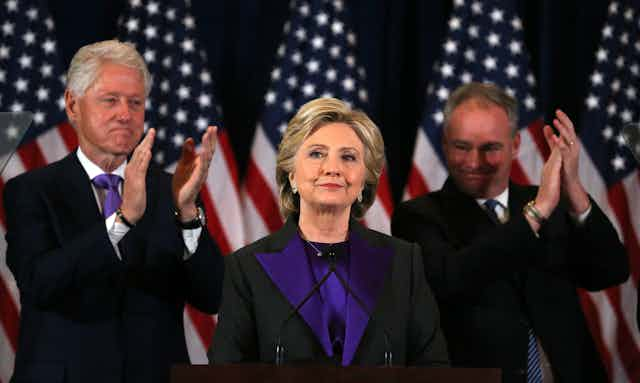After a long night waiting for election returns to trickle in, Hillary Rodham Clinton took to the stage Wednesday morning in New York City to concede the presidency to Donald Trump, a ritual of closure necessary for the stability of the nation.
A concession speech signals the peaceful transition of power between one leader and the next. While acknowledging change, it also needs to stress continuity: Even though one party will be replaced by another, the republic will endure.
Clinton’s speech was full of emotion and regret. She assured her supporters that, like them, she was “disappointed” and found Trump’s election “painful” just “like tens of millions of Americans who invested their hopes and dreams in this effort.”
But she pledged her support to Trump and offered “to work with him on behalf of our country.”
“I hope that he will be a successful president for all Americans,” she said.
A good concession speech will use what rhetorical scholars call “transcendent rhetoric,” which emphasizes what unites us, not what divides us.
Senator John McCain’s 2008 concession speech is an excellent recent example of how a speaker can use transcendent rhetoric for this purpose. In his speech McCain praised Obama, his values, his campaign and his success. He highlighted the ways that he and Obama were similar, and stressed their common ground as Americans, despite differing political views. Then, in what was probably the most memorable part of the speech, McCain appealed to national unity:
“I urge all Americans who supported me to join me in not just congratulating him, but offering our next president our goodwill and earnest effort to find ways to come together, to find the necessary compromises, to bridge our differences and help restore our prosperity, defend our security in a dangerous world, and leave our children and grandchildren a stronger, better country than we inherited.”
Like McCain’s 2008 speech, Clinton’s contained an explicit appeal to national transcendence:
“I believe we are stronger together and we will go forward together. And you should never, ever regret fighting for that. You know, scripture tells us, let us not grow weary of doing good, for in good season we shall reap. My friends, let us have faith in each other, let us not grow weary and lose heart, for there are more seasons to come and there is more work to do.”
Concession speeches work when they validate the democratic process and help the nation to move forward from the divisiveness of the campaign. A failure to persuade the nation to unite and move past the election will make it more difficult for the new president to lead the nation, so there was much at stake in Clinton’s speech.
Yes, she expressed her own frustration, disappointment and pain. But she also pledged to work with President-elect Trump to help America live up to its promise.
In doing so, she demonstrated magnanimity and leadership.

